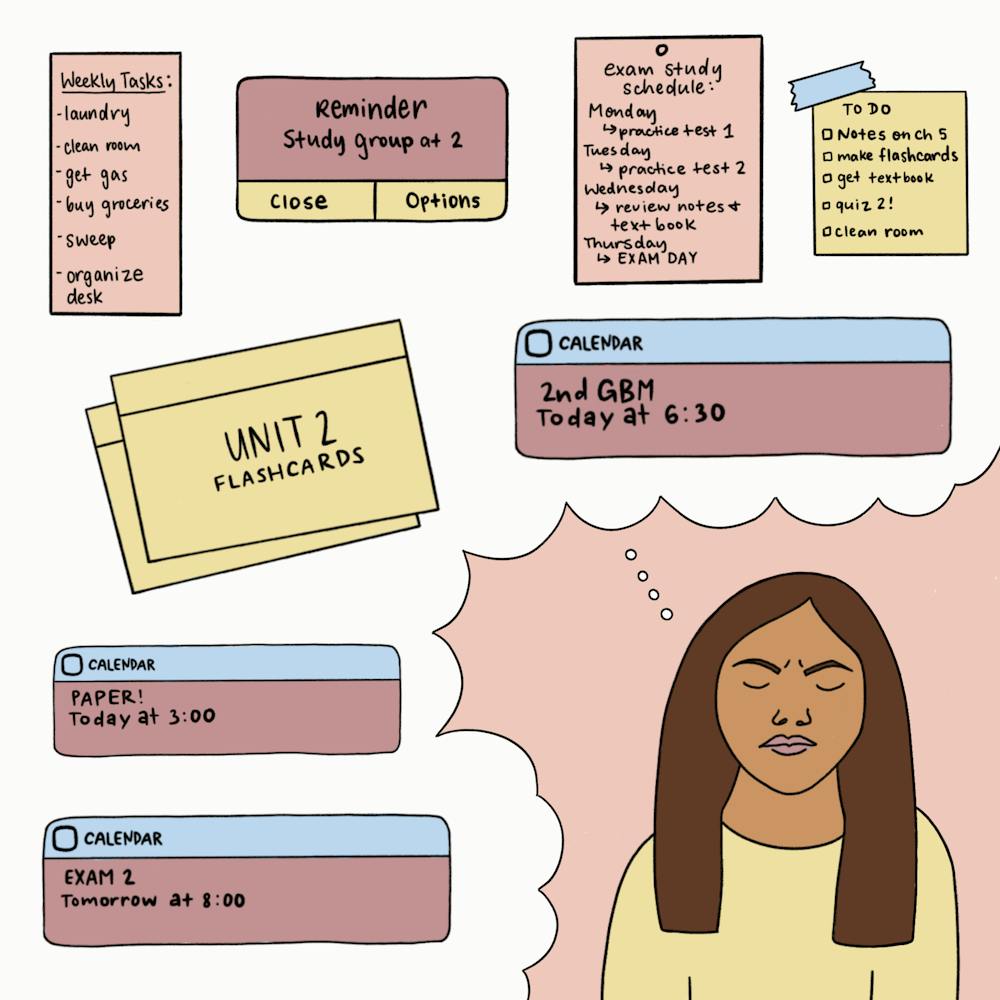Pass by Marston Library and you’ll see the usual suspects: the guy frantically flipping through the blue pages of his Study Edge Packet; the girl chugging her third watermelon Celsius while on the verge of tears; and the freshman sweating bullets trying to understand “Siddhartha,” the hallmark text for UF’s infamous “What Is The Good Life?” course.
It’s not even finals week — October just started.
As UF enters its first full in-person semester since the COVID-19 pandemic began, a quick shift to a live learning environment, along with the pandemic fallout, caused mental health strains in students. Within just six weeks of the new semester, students at UF say they are struggling to cope with all the strain placed upon them to succeed.
“I feel like people are just trying to catch up for what they missed out on … that they couldn't complete during the mostly online COVID time,” said Leslie Zepeda, a 20-year-old UF psychology junior.
Zepeda said for her, along with many other pre-med students, this first semester back in person has been extremely challenging because of the lack of available hands-on experiences in their field.
“With COVID, it's been very hard to get the opportunities that med schools require,” Zepeda said. “Physicians aren't really allowing people to shadow them because of COVID regulations.”
She said volunteer opportunities and research lab positions have also become extremely competitive due to the various regulations put in place.
Zepeda isn’t the only one who feels the competition has increased. Tatiana Gomez, a senior biology major on a pre-dental track, feels students are becoming more competitive to adjust to harder college application expectations and increasing test scores.
“Pre-med is so toxic,” she said. “Everyone's like 'I get A's in physics 1' and I'm over here like 'I barely passed physics.'"
Gomez is the president of the Pre-Dental American Student Dental Association, a Study Edge ambassador, a member of Delta Delta Sigma Pre-Dental Honor Society and an Equal Access Clinic volunteer. As a part-time research assistant who also shadows an orthodontist, she said feels burnt out.
The Fall semester — the first full-capacity and in-person semester since March 2020 — has challenged her to adapt to rapid changes in learning environments, she said.
“Now I have to calculate getting up in the morning, getting dressed, getting on the bus, going to campus, walking to class. And it's just … very overwhelming,” Zepeda said.
Zepeda said UF’s structure is inherently competitive — a mentality that can trickle down to the student body.
“I feel like students as well see each other more as competition than friends or classmates,” Zepeda said. “It's very rare, the people that will reach out and help.”
Though UF offers various mental health resources on campus, including the Counseling and Wellness Center and the GatorWell Health Promotion Services, many students believe this isn’t good enough. Some students are aware of the services, but they aren't too sure of their effectiveness.
“The students don't go to that [CWC],” Gomez said. “I think they could do a much better job than what they're doing right now.”
Zepeda believes UF places an emphasis on academics while failing to adequately address the mental health aspect of succeeding in such rigorous courses.
This year, for example, UF was ranked as a top public university in the country, according to U.S. News & World Report. Still, some students believe this achievement came at the cost of their well being.
“I feel like sometimes they just don't really adjust [to] the needs of students because they want to be at the top and get to the best,” Zepeda said.
As students are left with inadequate resources to ease their stress, Gomez suggested they find options outside the university to take care of their mental health.
“Talk to people,” Gomez said. “Literally just give yourself breaks. Actual breaks. Having a spa night, hanging out with your friends, going out to eat to different places really helps.”
Contact Luigi Bencosme at lbencosme@alligator.org.
Luigi is a third-year media production, management, and technology major at UF and is currently one of the multimedia editors for the Alligator. Prior to his editor position, Luigi was a staff writer under the Avenue as well as the podcast producer for Rowdy Magazine. In his free time, he likes to read up and investigate the most obscure fun facts that would interest no one else.






